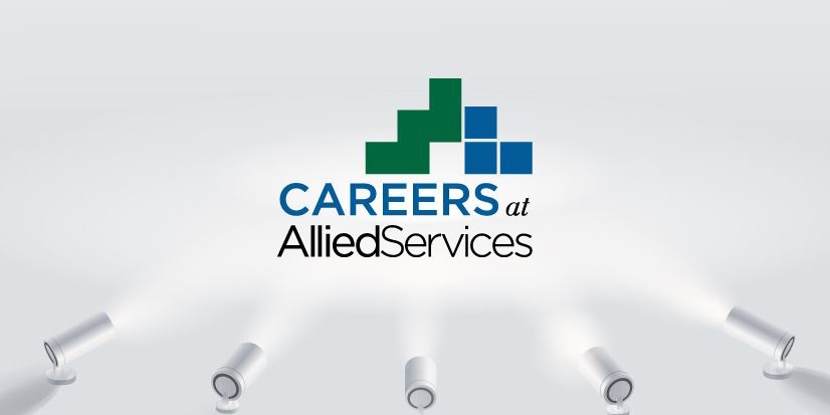Stroke recovery: Tom's journey
- Category: Skilled Nursing, Stroke Recovery
- Posted On:
- Written By: Allied Services Integrated Health

When we talk about stroke and stroke recovery, we often repeat the caveat that every survivor's experience and rehab journey is different, just as no two strokes are alike. This can be especially hard to face for patients whose recovery progresses slower than they expect.
For one family, focusing on the small and sometimes large incremental steps forward has helped them to stay positive and connected.
In 2018, Tom C of Scranton underwent a standard heart operation and some months later suffered a serious stroke.
A stroke occurs when a blood vessel leading to the brain is either blocked or bursts. It can affect everyone in different ways, and can lead to trouble speaking, comprehending, and moving.
Due to some complications, Tom spent three months in the acute care hospital and needed to be put on a ventilator. He was eventually moved to Allied Services Skilled Nursing Center in Scranton where he began his rehabilitation.
Tom’s wife, Cindy, detailed his experience.
“He was in very bad shape. After his stroke, he couldn’t do anything. He couldn’t walk. He couldn’t talk. He needed a ventilator to breathe. He wasn’t even awake much.”
“When he was first brought to Allied, he started going through every type of therapy that you could imagine. Physical, speech, you name it. I’ll say though that over the years the progress has been great.”
Since his arrival at Allied Services in 2019, Tom has shown great progress in function thanks to his hard work in therapy. He has improved so much that recently he was taken off of the ventilator.
“He’s off of the ventilator, although he still has to keep his tube in for the tracheostomy, but he can talk again," says Cindy. "His walking isn’t perfect, due to his stroke, his right side will always be a challenge.”
In addition to speech, respiratory, occupational and physical therapy, Tom receives recreational therapy. Essentially, this form of therapy enables individuals to do some form of activity as a way to heal. Activities can include arts, crafts, playing games, and other entertainment.
“Tom loves the recreational therapy. He paints a lot. He loves painting pictures and sculptures, and we send them to our grandkids. He also likes to go see the entertainment that they offer every week. They take him outside a lot too. In fact, they work with him every day.”
“The treatment he receives at Allied has been wonderful. All of the aides, therapists, and nurses have been excellent.”
After managing life separated for the past few years, there’s light at the end of the tunnel for Tom, Cindy and their family. Bein]]Skilled g taken off of a ventilator is a large step in Tom’s recovery. If all goes well, his tracheostomy tube will be taken out next. Soon, Tom might be able to move back home with his wife.
“We’ve been managing over the years. I visit him every day, and about once a month we take him out to our son’s house. All of Tom’s friends come over, and the family does too. We’ll visit with him all day long.”
“This summer we have an appointment to re-evaluate how he’s doing. Hopefully, if all is good, he can finally come home.”
Skilled Nursing Care
Allied Services is committed to supporting the health, independence and quality of life of its patients and residents. Skilled nursing – specifically, rehabilitation care provided alongside expert round-the-clock nursing care – may be necessary for individuals who have suffered an injury or illness and cannot live safely at home or at an assisted living facility. Our skilled nursing facilities provide comprehensive care for both short-term and long-term patients. Learn more here.
Stroke Recovery at Allied Services
Our inpatient and outpatient stroke rehab programs address physical, cognitive, behavioral, and socialization needs as well as identify and manage risk factors to help prevent future strokes. To learn more:



